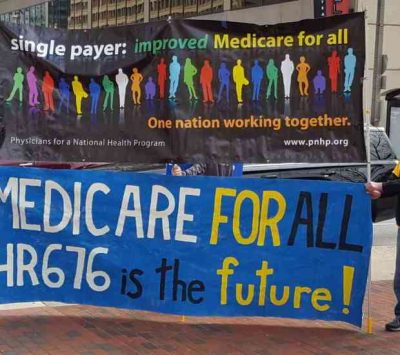COVID-19 Reveals Why Medicare for All Is an Idea Whose Time Has Come

The world’s richest country USA is the only developed one without some form of universal healthcare.
Americans get marketplace medicine instead, an inequitable system for a fundamental human right.
It prioritizes profits over human health, leaving growing millions in the US uninsured, most others way underinsured because of high cost — making healthcare in the US the way it should be for everyone unaffordable.
Should corporate insurers with bottom line priorities over all else decide what medical care they will or won’t pay for and how much?
Should millions of poor and low-income households be deprived of vital healthcare when most needed because it’s unaffordable?
Medical treatment decisions should be made by doctors and other qualified health professionals, not politicians, bureaucrats, or business.
High healthcare costs in the US, double the amount of other developed countries, is the leading cause of consumer bankruptcies.
According to the American Journal of Public Health (AJPH) in March 2019, around two-thirds of household bankruptcies were because of unaffordable healthcare or unpaid time away from work.
Because of high-cost/sharply rising premiums, deductibles and co-pays, healthcare insurance or enough of it for full coverage is unaffordable for most Americans.
The AJPH noted that Obamacare “did not change the proportion of bankruptcies with medical causes.”
Three years after its enactment, medical bankruptcies were slightly higher than earlier. Physicians for a National Health Program (PNHP) co-founder Dr. David Himmelstein explained why, saying:
“Unless you’re Jeff Bezos, people don’t have very good alternatives, because the insurance that is available and affordable to people, or that most people’s employers provide them, is not adequate protection if you’re sick.”
Most US households live from paycheck to paycheck with scant savings or none at all.
According to the Bankrate personal finance website in January 2019, only 40% of US households have enough savings to cover an unexpected $1,000 expense.
Most Americans are woefully unprepared for the ongoing health and economic crisis that may be the severest in US history before ending at an unknown future time.
The American Public Health Association explained that bankruptcy filers for medical reasons are in worse health and more likely to skip needed treatments and medications, greatly endangering them.
Spreading COVID-19, mass layoffs and unemployment in the US show why Medicare for all is an idea whose time has come with great urgency to enact into law now.
PNHP called for improved universal healthcare for all Americans — everyone in, no one left out, prioritizing public and personal health over profit-making by insurers, Big Pharma, and large hospital chains.
Its website states that “the only permanent solution is to enact a single-payer national health program that would:
- Cover all US residents for all medically necessary care;
- Totally eliminate out-of-pocket spending;
- Guarantee appropriate health resources in all communities based on medical need;
- Increase public health spending and invest in research to improve population health; and
- Maintain the capacity to respond to nationwide crises in a unified manner” like what’s occurring in real time now, adding:
“COVID-19 is just one dramatic example of our failure to care for vulnerable patients and marginalized populations.”
Hand-washing, social distancing, sheltering in place, and more draconian lockdowns to contain and eliminate COVID-19 outbreaks ignore core healthcare inequality and inadequacy of our time and earlier in the US — lack of healthcare for everyone in the country, a vital human right not addressed.
Food, shelter, clothing, and healthcare when needed are the most fundamental human rights of all.
In the US, they’re based on the ability to pay, why millions of people in the country live on the edge.
Millions are food insecure. Hundreds of thousands are homeless, and most Americans have no healthcare coverage or not enough.
PNHP co-founder Dr. Steffie Woolhander expressed frustration, saying “(t)he lack of Medicare for all is forcing (doctors and other healthcare professionals) to fight this (battle) with one hand tied behind our back.”
The medical community and society overall “have to conquer coronavirus altogether. That’s the whole idea behind Medicare for all.”
If not now at a time of a growing national emergency, when?
If the medical community and millions of ordinary Americans don’t demand it now, who will?
If that doesn’t express a sense of urgency for a vitally needed human right when most needed, what will?
A Final Comment
According to Government Accountability Office and Congressional Budget Office estimates, administrative/bureaucratic savings would free up enough funds to provide world-class healthcare for all Americans – without increasing total spending.
In January, PNHP explained that Medicare for all can save about $600 billion annually in the US by eliminating middlemen bureaucracy and paperwork that costs over one-third of what’s spent on healthcare — fivefold what Canada spends.
Dr. Himmelstein explained that “(t)he difference (in administrative costs) between Canada and the US is enough to not only cover all the uninsured but also to eliminate all the copayments and deductibles, and to amp up home care for the elderly and disabled,” adding:
“And frankly…money (will) be left over.”
According to Public Citizen, the US healthcare industry “wants you to think universal healthcare is too expensive.”
“In reality, it’s our current system that’s a wasteful, unsustainable disaster.”
At a time when the vast majority of Americans are hunkered down at home and scared to death about COVID-19, Medicare for all is the only acceptable way to assure healthcare is provided for all Americans when needed.
*
Note to readers: please click the share buttons below. Forward this article to your email lists. Crosspost on your blog site, internet forums. etc.
Award-winning author Stephen Lendman lives in Chicago. He can be reached at [email protected]. He is a Research Associate of the Centre for Research on Globalization (CRG)
His new book as editor and contributor is titled “Flashpoint in Ukraine: US Drive for Hegemony Risks WW III.”
http://www.claritypress.com/LendmanIII.html
Visit his blog site at sjlendman.blogspot.com.

